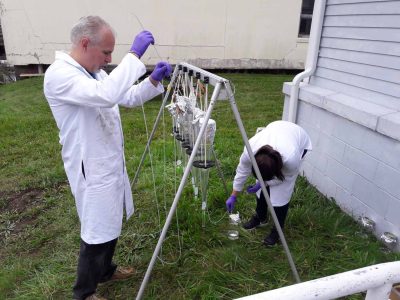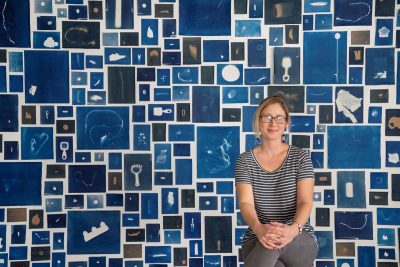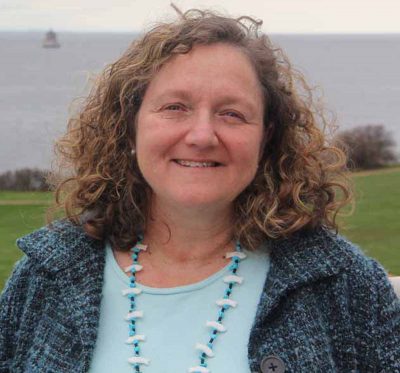
Photographer Elizabeth Ellenwood and UConn Marine Sciences Prof. J. Evan Ward will offer different and complementary perspectives on the proliferation of plastics in the marine environment at a Feb. 25 talk at the Avery Point campus of the University of Connecticut. Syma Ebbin, research coordinator at Connecticut Sea Grant, will introduce the speakers and offer remarks about growing support for measures to reduce plastic use.
Titled “Visualizing Plastic: Integrating Science and Art to Inspire Change,” the free public presentation is part of the 24th annual Coastal Perspectives Lecture Series co-sponsored by Connecticut Sea Grant, the UConn Department of Marine Sciences, the UConn Maritime Studies Program and UConn Avery Point. It will take place at 7:30 p.m. in the Auditorium in the Academic Building.
“Among the Tides,” an exhibit created by Ellenwood of cyanotype and digital photographs of plastic beach trash and microplastics, is currently on display at the Alexey von Schlippe Gallery at Avery Point. Located in the Branford House, the gallery will be open from 6:30 to 7:30 p.m. on Feb. 25 so that her work can be viewed before the lecture. The exhibit can also be viewed through March 15 during the gallery’s regular hours, from noon to 4 p.m. Thursday through Sunday. Admission is free.
Prof. Ward, head of the UConn Marine Sciences Department, conducts research on shellfish and microplastics – tiny plastic particles that fray off of larger pieces. He is preparing for a new phase of the project focused on aquaculture, with funding support from Connecticut Sea Grant. Ward said his talk will include short video segments taken inside of living bivalves with an endoscope, showing how plastic particles are captured and transported by the gills of shellfish. While his research is ongoing, results so far are a “good news story” for the shellfish industry and shellfish consumers, he said.
“There’s been a lot of media attention on microplastics and shellfish,” he said. “It’s important for people to understand that shellfish are selective particle feeders. This means that although they can capture a wide range of microplastics, they spit out a lot of them prior to ingestion.”
Given their ability to selectively ingest particles, in Ward’s opinion, “with respect to microplastics, bivalves are safe to eat.”
“Although bivalves can be harmed by certain types of microplastic particles, there are other animals that are at a higher risk of being harmed by macro- and microplastics such as birds, fish, and other filter-feeding animals when they mistake the plastic for food,” he said. Additionally, chemicals used to make plastics can leach into the marine environment and into the gut of these animals. This leaching is an additional concern, he added.

Ellenwood said she is hoping her work helps raise awareness and inspires action to reduce plastics in the environment. In addition to using beach trash in her work, she also creates images of microplastics – normally only visible under a microscope in a science lab – and makes them visible to the public.
“My project of artistically cataloguing marine debris has opened my eyes to the individual responsibility we have as consumers,” she said. “Each time we use a straw, plastic bag, or plastic bottle, it matters. Prior to starting my project, I had not taken notice of how many drinks would automatically come with a straw, or how many to go cups I used because I forgot my reusable one. I now make conscious decisions to avoid using single-use items. My hope is to provide images for viewers to connect with and inspire them to not use single use plastics, or to volunteer at a beach clean-up. I believe we are all responsible for our planet and for working together to create awareness and understanding.”
She said the purpose of her work is to create “beautiful, yet haunting images aimed at making the widespread marine debris issue visible” that also emphasizes the need for research on the impact of plastics.
“We are at a critical moment to not only understand the marine and plastic pollution that we are responsible for, but also to prioritize a change in our mass consumption and production,” said Ellenwood, a Pawcatuck resident and master of fine arts student at UConn. “The ocean pollution crisis is a massive problem that the human race needs to work together on, sharing knowledge in different fields and collaborating to prevent imminent disaster for future generations.“

Ebbin, who oversees the annual arts award, said Ellenwood’s work illustrates the power of interdisciplinary projects that help make the work going on in research labs accessible to the public.
“In creating her art, Liz has worked closely with scientists and integrates the knowledge she has gained from these experiences into her subjects and creative process,” Ebbin said. “She hopes her art will lead to greater public awareness of trash and, more specifically, plastics in our marine environment. Her use of found materials and aesthetic transformation of these materials into objects of beauty is the means by which she seeks to get the public’s attention and encourage behavior changes, ultimately leading a cleaner ocean and earth.”
For more information on the Coastal Perspectives Lecture Series and future events, visit: http://www.marinesciences.uconn.edu/lectures; do an Internet search for “UConn Coastal;” or send an email to: CoastalPerspectives@uconn.edu.
For information on this event, contact Judy Benson, Connecticut Sea Grant communications coordinator, at: judy.benson@uconn.edu or at: (860) 405-9141.